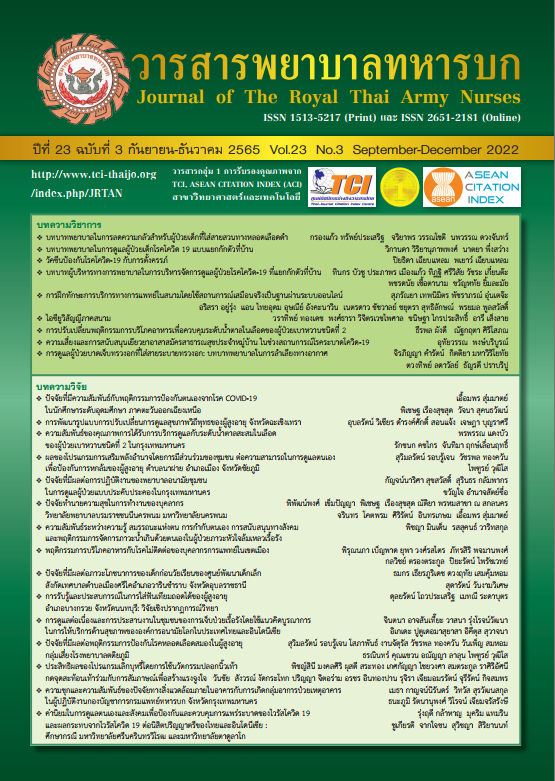Factors Influencing Nutritional Status of Pre-School Age Children Development Centers in Subdistrict Municipality Mueang Si Khai Subdistrict Warinchamrab District, Ubonratchathani Province
-
Keywords:
nutritional status, pre-school children, parental factorsAbstract
The predictive correlational research aimed to study the parental factors influencing nutritional status of pre-school children. The samples consisted of 88 parental pre-school children. The samples were selected by random simple sampling. The research instruments were questionnaire which developed by researcher. The content validity and reliability of the nutritional knowledge questionnaire was analyzed by using KR-20 at 0.71. The food providing behaviors and nutritional care behaviors questionnaire were also analyzed by using Cronbach’ s alpha coefficient at 0.83 and 0.76, respectively. The data were analyzed by Descriptive statistics, Pearson’s correlation coefficient and Stepwise multiple regression analysis.
The results revealed that the two predisposing factors were statistically significantly associated and could predicted nutritional status of pre-school age children. The food providing behaviors (β = 2.31, p < .05) and nutritional care behaviors (β = 0.485, p < .05) were significantly positively correlated and could predicted nutritional status of pre-school age children at the level of 39% (R2 = 0.399, p < .05). The result of this study could be used as guideline to develop the promoting program for parental of pre-school age children and they could be able to care the children for development of maturity and good nutritional status.
Downloads
References
Unicef, WHO, The World Bank group. Level and Trend in Child Malnutrition. Geneva Switzerland: World Health Organization; 2020.
The National Statistical Office. Monitoring the situation of children and women. Nonthaburi: National Office of Buddhism; 2019. (in Thai)
Martin VL, Florencio TC, Grillo LF, Franco MC, Martins PG, Clemente AL, editors. Long-lasting effects of undernutrition. International Journal of Environmental Research and Public Health; 2011: 1817-1846.
Mendez MA, Adair LS. Severity and timing of stunting in first two year of life affect performance on cognitive tests in late childhood. J Nutr; 1999: 1555-1565.
Venables PH, Raine AL. Poor Nutrition at Age 3 and Schizotypal Personality at Age 23: The Mediating Role of Age 11 Cognitive Functioning. American Journal of Psychiatry. 2012;169(8): 822-830.
Anonjarn K, Odomporn O. The Influence of Health Literacy with Consumption and Exercise Behavior among School-age Children with Overnutrition. Journal of The Royal Thai Army Nurses. 2021; 22(2): 314-326. (in Thai)
Suwanwaha S, Ampansirirat A, Suwanwaiphattana W. Factor Related to Nutritional Status Among Preschool Aged Children: A Systematic Review: The Journal of Baromarajonani College of Nusing, Nakhonratchasima. 2019; 25(2): 8-23. (in Thai)
Sirinam W. Factors influencing nutritional status of Children development centers in Banklang Subdistrict Municipality Sanpatong District, Chiang Mai Province. (thesis). Chaingmai: Ratchaphat Chaingmai University; 2019. (in Thai)
Schwartz NE. Nutrition knowledge, attitudes, and practices of high school graduates. J Am Dietetic; 1995.
Nantapong S, Saratapun N, Hirunwong A. Parents’ knowledge on nutrition and meal-providing behavior for preschool children at a public school in Chumphon province. Kasetsart Journal of Society and Science. 2014;35(3): 235-244. (In Thai).
World Health Organization. Child growth standards and the identification of severe malnutrition in infants and children. World Health Organization Geneva Switzerland; 2015.
Thienphuridej T. A comparative study of Parental factors between thin and normal pre-school children in Warinchamrap District, Ubonratchathani Province. Journal of nursing and health. 2019; 44(3): 84-95. (In Thai)
Downloads
Published
How to Cite
Issue
Section
License
Copyright (c) 2022 Journal of The Royal Thai Army Nurses

This work is licensed under a Creative Commons Attribution-NonCommercial-NoDerivatives 4.0 International License.
บทความหรือข้อคิดเห็นใดใดที่ปรากฏในวารสารพยาบาลทหารบกเป็นวรรณกรรมของผู้เขียน ซึ่งบรรณาธิการหรือสมาคมพยาบาลทหารบก ไม่จำเป็นต้องเห็นด้วย
บทความที่ได้รับการตีพิมพ์เป็นลิขสิทธิ์ของวารสารพยาบาลทหารบก
The ideas and opinions expressed in the Journal of The Royal Thai Army Nurses are those of the authors and not necessarily those
of the editor or Royal Thai Army Nurses Association.






